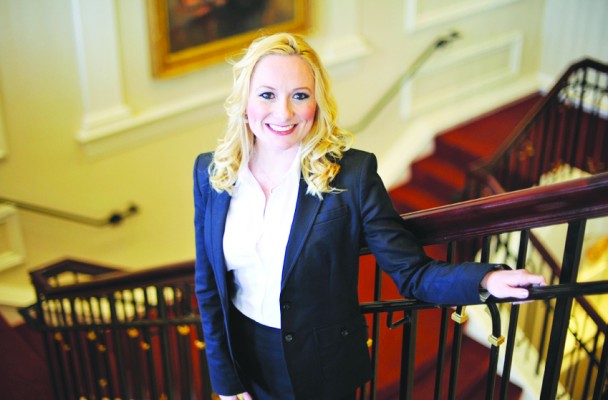Dr. Sadie Leder Elder receives national teaching excellence award

Dr. Sadie Leder Elder prides herself on the personal relationships she develops with students. Photo by: highpoint.edu
By Jodi Guglielmi, Editor-in-Chief //
Along with perfecting their craft of teaching in the classroom, many professors at High Point University strive to advance their professional career outside of the classroom as well. Through their research, professors from all departments have published books and articles for academic journals, assisted in discovery new ideas and methods, and won numerous awards recognizing their work. It seems like nearly every week an HPU professor is noted for their accomplishments inside and outside of the classroom. One of these professors is Dr. Sadie Leder Elder, an Assistant Professor of Psychology at HPU.
This year, Elder was awarded The Society for the Teaching of Psychology’s Jane S. Halonen Teaching Excellence Award for Early Career Psychologists. The award recognizes outstanding early career psychologists in their first seven years as an educator for their teaching effectiveness, mentorship of students’ professional development, and commitment to enhancing the science of teaching and learning through both scholarship and service.
“I love what I do and I’m really passionate about continuing to try be the kind of teacher who inspires my students. Whenever I’m able to light a fire of passion in one of my students, it’s very exciting,” said Elder. “Being at a university like HPU makes it possible because my class sizes are small and I work with many students all four years that they are with us – that really helps foster that connection that I think is important for being a good teacher.”
With classes ranging from intro to psychology to senior level courses focusing on her specialty in social psychology and relationships, Elder is able to understand the different types of learning that comes with each level. Using hands on activities and creating a classroom environment that allows for open and honest discussion, Elder is able to increase the educational quality of her classes.
One way she does this is through her use of pop culture related examples in class. She finds movies and celebrities that students will recognize and that she can tie the science of psychology to.
Senior Emilie Held, who will have her third class with Elder this spring, can attest to the success of this teaching practice, “Dr. Elder’s teaching is impactful because she uses an applied curriculum, meaning she does not just discuss the information in class, but asks students to consider how the different theories are seen in everyday life. We gather examples from the media to discuss how relationships concepts apply to real life. It makes the material more meaningful because we immediately relate to it.”
Outside of the classroom, Elder regularly contributes to The Science of Relationships, a website where people can go to get user-friendly, but empirically sound psychology information to answer their relationship questions. With articles titled, “Dear Miley, You’re Doing It Wrong” and “All I Didn’t Want To Know About Relationships, I Learned From The Jersey Shore” she uses the same practice as in the classroom so students have yet another way to connect to the material. She also wants it to serve as a teaching tool for other classrooms to use as well through the use of teaching examples and activities.
Not only did her writing win her the Editor’s Choice Award for the best Science of Relationships article of 2013, but she has also been involved with two national surveys, a Teaching of Psychology journal article, two published eBooks, and countless presentations at national conferences including the Teaching Preconference at the annual meeting of the Society for Personality and Social Psychology and symposia and poster presentations at the American Psychological Association’s annual conventions. All of these accomplishments helped contribute to her winning of the Teaching Excellence Award.
She stresses the importance of outside research to her success in the classroom. “I think it is important that students see their professors constantly striving to learn. It can help inspire students to want to do the same, when they see how much you care about what you are teaching, it helps them care in return.”